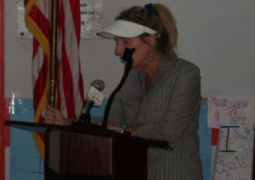(Published in the Daily Observer April 27, 2011)
In less than two weeks, the late Rt. Revd. Archbishop Dr. Solomon Tilewa Johnson, first Archbishop of the Internal Province of West Africa and the Ninth Primate and Metropolitan of the Church of the Province of West Africa will finally be laid to rest.
On Sunday 5th January 2014, the Metropolitan Archbishop was the genial host of a birthday lunch/dinner for his youngest daughter visiting from the United States at Maduka House, his family residence in Fajara. Just over two weeks later, on Tuesday 21st January he fell unconscious while playing tennis at the Fajara Club and was later pronounced dead at the nearby Medical Research Council (MRC). He always enjoyed the game of tennis which he played with vitality and flair, always full of cheer and good spirits towards all other players on and off the court. In doubles (involving two teams of two players on each side), he always liked to designate himself as the junior partner and to address histeam mate as his “Captain”, thus surrendering all game strategy decisions to the captain.
A couple of years ago, he was my regular partner at the Tennis Section of Fajara Club, and the role of captain was for me to assume. One day, I told him that I had observed something and needed clarification. With charming warmth he enquired: “What is it Captain, Sir”. I said: “Well, I thought I was the only Captain you have, but I see that whenever I am not on the court you have been addressing many others as ‘Captain’”. His response was as predictable as it was witty; in a low voice and with a characteristic bland, affable chuckle, he gave me an assurance: “Oh, don’t worry Sir, you are the Captain, all others are Capies”.
Such humility and self-deprecation, ingenious humor and biting wit formed part of the building blocks of his saccharine and reverent personality, which had viral appeal wherever he went. His every move, action or utterance exuded cheerfulness, humility and the desire for affinity. He was always charitable in his opinion of others and held everybody in high esteem while maintaining himself as a mere humble being. I believe such disposition of the Archbishop reflected an esteemed example of Christian humility:
“Do nothing from selfish ambition or conceit,
but in humility count others more significant than yourselves.”
(Philippians 2:3)
As the stunning news of his death flamed out, strained emotions blazed throughout the community, and beyond. This was soon followed by the steady flow of unstinted and incandescent tributes to this great and devoted man of God consecrated to the service of humanity. On January 28, 2014 the members of the tennis group of Fajara Club led by Mr. Francis Rene Blain and Dr. Tijan Senghore, the FajaraClub Tennis Captain, visited the home of the late Archbishop to express their condolences to Mrs. Johnson and pay homage to an esteemed colleague and friend. On that occasion, Mr. Blain delivered a glowing tribute to the Archbishop, citing, among many qualities of the man, his exemplary camaraderie and congeniality; his passion for the game of tennis; his magnetic appeal; and his unique ability to reach out to people everywhere and across all religious divides.
As testimony to his inter-faith outreach, several Muslim organizations or groups responded to the news of his death with deeply felt sympathy and prayers. Shortly after the sad news reached them, a delegation of the Committee of Banjul Muslim Elders (CBME) led by the Imam Ratib of Banjul, Alhagie Cherno Alieu Mass-Kah, the President of Pipeline Mosque Foundation, Alh. Abou Dandeh Njie and a representative of the President of the Gambia Supreme Islamic Council in the person of Alhaji Sheriff Badjan and others went to the Johnsons’ residence in Fajara to pay tribute and pray for the late Archbishop (The Point Newspaper 30 January 2014). Alhaji Alieu Mboge, Secretary General of the CBME, in a tribute presented on behalf of the Imam Ratib and the Banjul Muslim Elders, stressed the universality of the Archbishop’s appeal, noting that “the spontaneous and widespread outpourings of sympathy for the loss of Archbishop Dr. Solomon Tilewa Johnson is a telling testament of the high worth in which he was held, and the wide appeal he had among Gambians and non-Gambians alike” Mr. Badjan characterized the late Archbishop as a “good man” and noted what he considered as the affinity between Muslims and Christians. On his part Alh. Abou Dandeh Njie described the late Archbishop as a “pious gentleman”, a “keen sportsman” and a “role model” who died young. Also at the gathering was Mr. James Gomez of the Night of St. Peter and St. Paul who observed that the late Rt. Rev Dr. Solomon Tilewa Johnson “was a soldier of the Lord and has fought gallantly”.
In an earlier tribute which appeared in the Daily Observer of 28 January 2014, Imam Alhagie Muhammed Tafsir Gaye, the representative of the Khalifa General de Tijan of Tivaoune in The Gambia expressed his condolences and prayers on behalf of the Khalifa General and the Ahlon Tivaoune Federation of The Gambia, and recalled his personal friendship with the Archbishop. “The late Bishop was my friend”, he noted “He used to invite me to their programmes and I do the same.… During our Mawlud Nabi (Gamo), Dr Johnson used to come and spend the evening with us.” Imam Tafsir Gaye pointed out that he was also invited to attend the enthronement ceremony for Dr. Johnson as the ninth primate and metropolitan of the CPWA, on Sunday 18th November 2012, at the Cathedral Church of Saint Marry in Banjul.“He was delighted when he saw me inside the Church”.
In another separate and illuminating tribute to the late Archbishop Mr. Charles Sarr Thomas (The Point Newspaper 30 January 2014) brought forth three important aspects of this amiable man’s life: His belief in the unity or oneness of mankind; the early signs of his reverential potential; and his contribution to “nation building”.
As a highly trained theologian and a well- read and pragmatic man with a burning desire to serve his fellow man, the Archbishop knew and believed that all men share a common nature and common problems and that the brotherhood of man or the unity of mankind is basic to biblical traditions as it is central to the teachings of other major religions. Like talent, virtue and rectitude appear early in one’s life. In his account of a drama exhibition called “Medicine for Love”, organized by the ‘Gambia Women Contemporary Society’ of Banjul (date unspecified), Mr. Thomas recalled the young Tilewa playing the role of a Reverend priest who went on stage to preach against evil practices. His thrilling performance on that day portrayed the precocious reverential talents of the young man, the significance of which did not escape the mature eyes of those present: “Dis boy na Reverend iffo be”, was the prophetic proclamation of Aunty Dorris Roberts of Fitzgerald Street, a sentiment shared by her associates in attendance. And so it happened: He was soon to become a priest in the Anglican Mission and later the first Gambian Bishop and on the18th of November, 2012 , he was enthroned at the St. Mary’s Cathedral inBanjul asthe first Gambian Archbishop of the Internal Province of West Africa and the Ninth Primate and Metropolitan of the Church of the Province of West Africa (CPWA) following his election on the 28th of September 2012, during a special Synod of the West Africa Section of the Anglican Communion, (namely the CPWA), held at Suacoco,Liberia. It was on the cusp of this top echelon of episcopal authority, and by a quirk of fate, that he died.
The third significant point made by Mr. Thomas is that the Archbishop never lagged behind in “nation building” - and in development discourse in general.He was a robust, energetic and intellectually astute religious leader who found comfort in immersing himself fully in the dialogue on some of the most intricate and complex development issues. At the national level he served actively and honorably in the governing bodies and policy organs of various intuitions in different sectors. At various international fora, he made presentations on wide ranging issues on the opportunities and challenges nations face in transforming their societies.
In acknowledgement of his strong interest in various facets of development, the West African Examination Council (WAEC) invited him to deliver the 13th Annual Endowment Fund Lecture of the Council on the 10th of March 2008 in Banjul. The topic was: “Enhanced Agricultural Education: An Inevitable Necessity for Survival.”
His treatment of this subject was comprehensive and professional and his presentation was well received by both educational and agricultural specialists. In a conversation with him a few days after the lecture I realized that he himself was very pleased with both the timeliness and relevance of bringing up such a topic for public discussion.
In his annual New Year, Easter and Christmas Messages, he used to dwell on some important topics relating to development,, such as poverty, natural disasters etc.,apart from discussing the significance of the occasion at hand and offering prayers, blessings and inspiring wishes
For example, in his Christmas Message of2009 (published in the Daily Observer, 24 December 2009) he addressed the challenges posed by environmental degradation and climate change, and noted that governments, individual organizations and citizens all have roles to play in containing pollution, promoting food security and protecting the environment:
“We should naturally expect our leaders and governments to take action in addressing problems of decay in our environment. However, each one of us should also be pro-active.”
The late Metropolitan Archbishop was also digitally savvy, and was particularly adept at the use of the Internet and social media platforms, such as Facebook, as a means to reach out to, communicate and exchange ideas and information with an extensive network of friends, relatives and associates across the globe. Even on the World Wide Web, where many would prefer to be anonymous, he was distinct- always convivial and reverent.
Whatever might be said about this man the extensive foot prints he left behind can hardly be adequately covered. What is clear, however, is that The Gambia’s religious landscape, especially the Christian sphere, without the Rt. Revd. Archbishop Dr. Solomon Tilewa Johnson, with his towering personality, his unmistakable presence in major national gatherings and on our TV screens, and his inspirational messages of faith and hope is hard to imagine. In many ways, however, his legacy will remain amaranthine and embalmed in the hearts and memories of all who knew him, and the cardinal lesson of his illustrious life shall remain for all to learn: The lesson of devotion, humility and simplicity.
God knows best why his precious and productive life ended the way it did. We as mere mortals can only believe that God has in store for him the best of his limitless benevolence and grace.
As part of these reflections, a word should be said about Mother Priscilla M.G. Johnson, wife of the late Metropolitan Archbishop. Being a priest and an educator herself, Mrs. Johnson has been a perfect match for the man, who by any measure was a fount of reverence and gentility. Their shared attributes as honorable and devoted persons of God cemented their compatibility and partnership for good. In these trying times, Mrs. Johnson has demonstrated extraordinary strength, comeliness, firm faith and certitude.May God continue to bless her and her children and grant them the strength and grace to faithfully absorb the pain and distress associated with the grievous loss of a loving and caring husband and father.
In any organization or community, the loss of any leader of the stature of the late Archbishop would inevitably leave a void of galactic proportion. May the Lord also grant the staff of the Archbishop’s office and the entire Anglican Mission consolation and relief, and furnish them with the sinews to maintain their unity and commitment.
By K.M. Bayo



